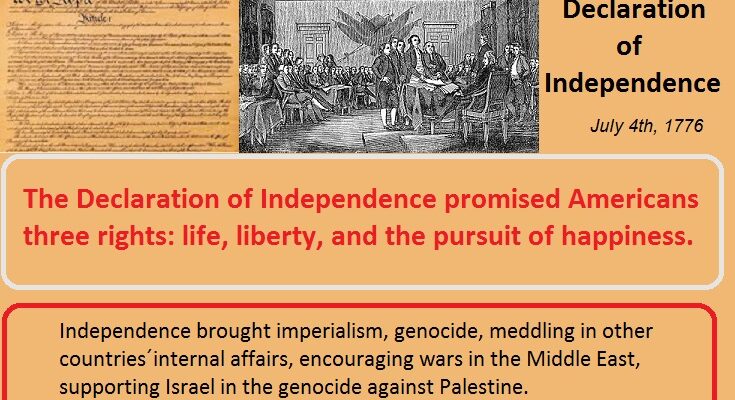Any country, any nation any territory, any community, any individual has no greater reason to celebrate than being free, independent, sovereign, enjoying the right to pursuit happiness, and to be equal above origin, color, beliefs and ideology. Why did the Thirteen Colonies seek their independence?
Throughout the 1760s and early 1770s, the North American colonists found themselves increasingly at odds with British imperial policies regarding taxation and frontier policy.
Tensions between Great Britain and the colonies steadily increased, fueled by incidents such as the Boston Massacre in 1770 and the Boston Tea Party in 1773. The British hit back by passing a series of punitive laws and restricting self-government in the colonies.
When repeated protests failed to influence British policies, and instead resulted in the closing of the port of Boston and the declaration of martial law in Massachusetts, the colonial governments sent delegates to a Continental Congress to coordinate a colonial boycott of British goods. When fighting broke out between American colonists and British forces in Massachusetts, the Continental Congress worked with local groups, originally intended to enforce the boycott, to coordinate resistance against the British.
Despite these changes, colonial leaders hoped to reconcile with the British Government. However, in late 1775, Benjamin Franklin, then a member of the Secret Committee of Correspondence, hinted to French agents and other European sympathizers that the colonies were increasingly leaning towards seeking independence. While Franklin also hoped to convince the French to supply the colonists with aid. Independence would be necessary, however, before French officials would consider the possibility of an alliance.
Throughout the winter of 1775–1776, the members of the Continental Congress came to view reconciliation with Britain as unlikely, and independence the only course of action available to them. When on December 22, 1775, the British Parliament prohibited trade with the colonies, Congress responded in April of 1776 by opening colonial ports—this was a major step towards severing ties with Britain.
The Declaration of Independence was adopted on July 4, 1776, the thirteen colonies declared themselves free and independent states at the Second Continental Congress by signing the Declaration of Independence. The Revolutionary War ended at Yorktown in October 1781, when Americans captured the British army there. On September 3, 1783, representatives from Great Britain and American signed the Treaty of Paris, which officially ended the conflict and established America’s complete separation from Great Britain.
The Declaration of Independence also promised Americans three rights: life, liberty, and the pursuit of happiness. This meant that the colonists had basic freedoms that the government could not take away.
While those oppressed and discriminated against had the right to fight for independence and today the US people have a reason to celebrate every July 4th. However, the internal and external policies do not deserve any celebration.
This American holiday serves as a painful reminder of this country’s violent history which many are still unaware of and which continues to be felt today, across this stolen land.
America’s Independence Day is, in a way, a celebration of imperialism, genocide, and American exceptionalism, and there is no pride in genocide.
David Treuer (Leech Lake Ojibwe) shares, “You can’t understand our Declaration of Independence without having a modicum of understanding of critical race theory because this country was founded on two principles. One was the theft of Indian land, and the other was the theft of Black labor in the form of slavery. And that is fundamental.
Furthermore, it should also be noted that U.S. interventions, military, and international aid have also caused violence throughout the world, disrupting democratic processes, and fueling wars in the Middle East, including billions of dollars of financial backing, aid, and military support to uphold the state of Israel and diminish Palestine.
Additional examples of the United States’ role in undermining other nations’ governance include interventions in South and Central America and its role in overthrowing democratically elected governments in Guatemala and Chile, just to name a few.
There is no pride in genocide and we cannot change history, but we can work towards a better future where all of our rights are respected and we all experience freedom and independence equally.




